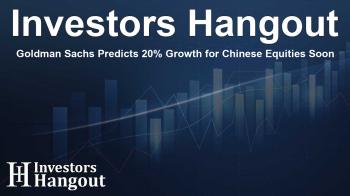Goldman Sachs Predicts 20% Growth for Chinese Equities Soon

Goldman Sachs Sees Bright Future for Chinese Equities
In an insightful outlook, a Goldman Sachs equity strategist has shared positive news for Chinese equity markets, expressing that they are resilient against current U.S.-China trade tensions. During an interview, it was revealed that Goldman Sachs anticipates a notable 20% growth in these equities despite concerns regarding trade tariffs.
Understanding the Context of Trade Tariffs
The backdrop of this forecast includes remarks made by U.S. President Donald Trump regarding potential tariffs of around 25%. While no specific details were provided, the discussion around these tariffs has been prevalent. Kinger Lau, the chief China equity strategist at Goldman Sachs, indicated that although there might be discussions and speculation about tariff increases, the core case is that such tariffs could rise by approximately 20 percentage points this year. However, Lau emphasized that the timing of these changes remains uncertain.
China's Economic Resilience
Lau pointed out that China possesses the capability to absorb these additional tariffs effectively. The Chinese government is expected to respond positively to ensure that any external pressures are mitigated. There will be a shift in focus from external demand to strengthening domestic demand, which is crucial for sustaining robust economic growth.
Forecasting Growth in Chinese Equities
From an investment perspective, Goldman Sachs is optimistic, predicting that Chinese equities will rise by approximately 20% within the coming year. This forecast reflects a dual approach where 10% of the anticipated growth is projected to arise from market multiple recoveries, while the other 10% is expected to stem from earnings growth. Excluding the impacts of tariffs, Goldman Sachs estimates low-teens growth in earnings from Chinese corporations for the year.
Impact of Tariffs on Earnings Growth
When factoring in the potential effects of tariffs, the earnings growth forecast adjusts to about 7%, which is slightly below general market expectations. Lau’s insights reflect a cautious yet hopeful view of the future of Chinese markets as they navigate through the complexities of international trade.
Frequently Asked Questions
What does Goldman Sachs predict for Chinese equity growth?
Goldman Sachs predicts a 20% growth in Chinese equities over the next 12 months, despite concerns about U.S. trade tariffs.
How will U.S. tariffs affect Chinese companies?
The anticipated tariffs may impact earnings growth, leading to a forecasted earnings increase of about 7%, lower than previously expected.
What are the main factors driving the forecasted growth?
The growth is expected to be driven by market recoveries and earnings growth, with equal contributions from both aspects.
Is there optimism from the Chinese government regarding trade tensions?
Yes, there is an expectation that the Chinese government will take positive measures to soften the external challenges posed by tariffs.
How resilient is the Chinese economy according to Goldman Sachs?
Goldman Sachs believes that the Chinese economy can effectively absorb the additional tariffs and shift focus to domestic demand to fuel growth.
About Investors Hangout
Investors Hangout is a leading online stock forum for financial discussion and learning, offering a wide range of free tools and resources. It draws in traders of all levels, who exchange market knowledge, investigate trading tactics, and keep an eye on industry developments in real time. Featuring financial articles, stock message boards, quotes, charts, company profiles, and live news updates. Through cooperative learning and a wealth of informational resources, it helps users from novices creating their first portfolios to experts honing their techniques. Join Investors Hangout today: https://investorshangout.com/
Disclaimer: The content of this article is solely for general informational purposes only; it does not represent legal, financial, or investment advice. Investors Hangout does not offer financial advice; the author is not a licensed financial advisor. Consult a qualified advisor before making any financial or investment decisions based on this article. The author's interpretation of publicly available data presented here; as a result, they should not be taken as advice to purchase, sell, or hold any securities mentioned or any other investments. If any of the material offered here is inaccurate, please contact us for corrections.
